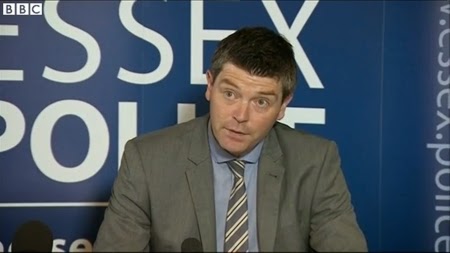First published on
FrontPage Magazine.
By Enza Ferreri
It's not enough that in Britain non-Muslim children in
publicly-funded schools, Islamic and non, are served halal meat - from animals whose throat is cut without proper stunning, according to the Islamic rite -, often without knowing it (and even
British forces have been discovered to be subjected to the same treatment).
Now schools in the UK are increasingly becoming the battleground of a war between radical Islam and the hopeless, dhimmi British "authorities", if this is the right term to use in the face of limp-wristed inaction.
I'm not the only one to have thought of a military metaphor. In the media, an alleged Islamic plot to take over schools has become a "Trojan horse".
A country in whose capital city the most popular baby name for boys is
Muhammad and the fourth most popular is Mohammed is doomed.
The gradual but inevitable progression of Muslim demographics brings with it the
equally inexorable advancement of Islamic tactics’ getting more and more aggressive and oppressive.
This is not the first time that the ongoing process of
Islamisation of British schools has found its way into the news. Official inspections, Department of Education involvement, school authorities without answers: we’ve been here before and, I dare say, we’ll be here again.
Above I’ve used the expression “radical Islam” - although I don’t see how Islam can be non-radical – for a specific reason. Sometimes this distinction is useful, if misleading.
What's happening in British schools? We have to be clear here. Bear with me, as the saga is still unfolding and mysterious.
First, there is a current, run-of-the-mill (“moderate”, shall we call it?) management of many Muslim schools - publicly funded, of course - which
does nothing wrong, according to the government’s education regulator Ofsted, except segregating boys and girls, “restricting” music and art classes although they are demanded by the national curriculum, requiring girls to wear headscarves, in short educating children according to the Islamic way of life.
I would contend that this is Islamisation of schools through and through. But no, Ofsted says, these are all positive things, expressions of Muslim identity and faith.
So, the brouhaha is just about a number of schools which risk becoming “really” Islamised and are investigated as possible targets of an "Islamic takeover", which goes even much further.
“Operation Trojan Horse” has become the nickname of an organised attempt by Islamists to co-opt schools in England and run them according to Muslim beliefs.
It all started with a
leaked letter, whose authenticity is still in question, discovered in March 2014 and alleged to be from Islamists in Birmingham, central England - the second largest UK city, home to a great Muslim population - outlining
plans to take control of schools there and possibly in other cities.
A month later Birmingham City Council said it had received hundreds of allegations of similar plots over a period of 20 years.
Investigations by Ofsted and the Education Funding Authority in 21 Birmingham schools did find
evidence of an orchestrated Islamist campaign to target particular schools, and that head teachers had been "marginalised or forced out of their jobs".
Six schools were placed in special measures after inspectors found systemic failings, including failure to take adequate steps to safeguard pupils against extremism. Thirteen more were found wanting. Ofsted’s investigations later expanded into schools in East London, Bradford and Luton, all areas with large Muslim populations.
But, typically, only 2 schools had their
funding terminated by the government.
In the aftermath, Education Secretary Michael Gove said that all UK schools must promote "British values".
The question, indeed the problem that has caused this whole crisis to develop, is that nobody seems capable of defining what British values are any more.
My bet is that, if Gove could provide a clear and precise definition of that concept, Birmingham schools would not have been the object of a concerted attempt of turning them into breeding grounds for Islamic terrorists in the first place.
British Prime Minister David Cameron, with the perfectly straight – or, lest I’m discriminatory, should I say gay as well as straight – face of someone who’s taking his own words very seriously, has attempted to lists some of these
elusive British values: freedom, tolerance, respect for the rule of law, belief in personal and social responsibility, and respect for British institutions.
I’ll say that Islamic leaders will find no reason to object to any of those.
Cameron suggested "freedom". Muslims see this as, for instance, freedom of religion, which in their case means
freedom to teach kids how to cut fully-conscious animals' throats during the religious and family festival of Eid, and then progressing to teach them how to become suicide bombers (which is the problem now under investigation).
Another example of freedom is that of Muslim girls to wear what my friend Alex Boot calls
"the traditional Halloween garb” even when it’s not Halloween.
Tolerance is very, very acceptable for Muslims: to them it means that we must tolerate whatever they do and say, without the need for them to reciprocate and tolerate us infidels.
Respect for the rule of law: perfect. They mean sharia law, of course, and they do respect it, without a doubt.
Belief in personal and social responsibility. The responsibility towards the Ummah, the wide community of all Muslims, is well understood and accepted by Mohammedans. That’s why Islamic charity is only directed at Muslims. Personal responsibility is also viewed favourably by Muslims, as shown by restraint in dress code, alcohol consumption, dietary limitations and so on.
Respect for British institutions may seem trickier at first sight, but not when you consider that they are planning to take over all these institutions, and they’ve already made a good start with schools. Once the afore-mentioned “British” institutions become what Muslims want them to be – outcome which appears to be more certain and speedy by the day -, they’ll have no problem in respecting them.
Cameron has fallen here into a little logical trap of circularity: you cannot use the
definiendum – the word to be defined – in the
definiens – the definition. You cannot explain Britishness with another reference to it.
But never mind. He’s still achieved a remarkable feat: giving a definition of British values so generic and vague that we can all agree with it, in a great multicultural, multireligious (or, not be discriminatory, multi-non-religious), multiethnic feast.
Of course, in order to give flesh and real significance to the concepts he chose, he would have been forced to introduce taboo words, like, off the top of my head, “Christian”.
The reason why "British values" has become a concept without meaning is the same why the European Union cannot find a unifying factor for Europe.
I've heard endless discussions on how we don't know what Britishness is, or Europe for that matter.
But it's obvious that, if you deny or remove the whole historical process that gave birth to - and the cultural foundations that sustain - the identity of a nation or part of the world, you end up with a shapeless, amorphous entity. You should then not be surprised that you cannot define it.
These days the dirty words, the 4-letter words that we cannot pronounce and therefore can't be used to define us are "Judaeo-Christian".
Judaeo-Christianity is what unifies Europe and what is at the core of Britain.
Britain is Christian. Its history demonstrates it, its Constitution confirms it.
If this had been recognised, Islam in Britain would not have been allowed to make the progress it has made.
The main characteristic and chief function of definitions is that they must be able to exclude as well as include. An all-inclusive definition means nothing.
The Latin verb “definire”, from which the English terms with the same root derive, literally means “to delimit, to place a boundary or border around” something.
That’s why in today’s world, in which all must be included – literally (haven't we
de facto abolished all borders?) as well as metaphorically -, to say or think something meaningful has become almost impossible, and when someone does it he risks imprisonment. Even more difficult is to do something that makes sense – as the British government wonderfully exemplifies.






